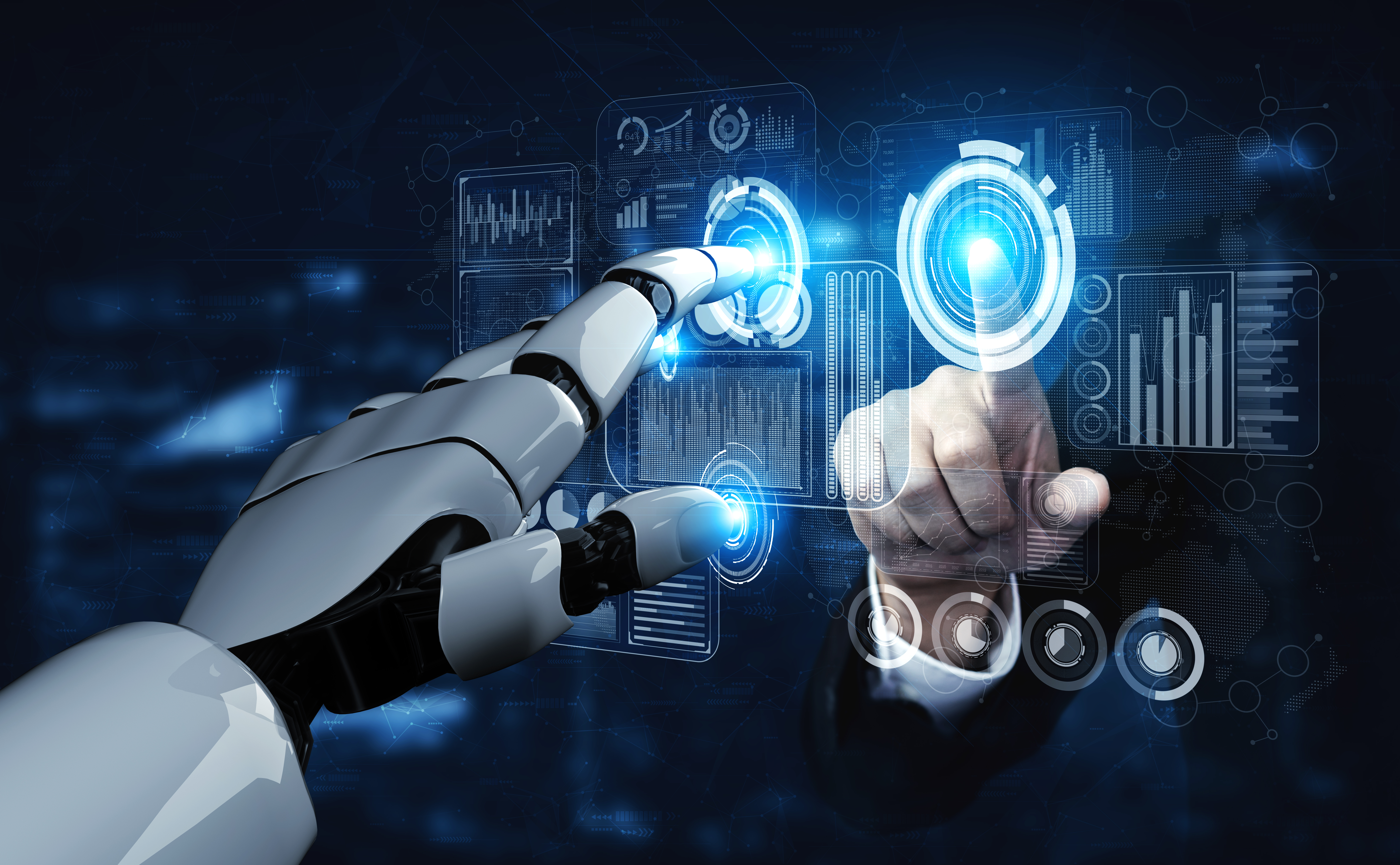
Study Artificial Intelligence Course: The Transformative Impact on Industries & Jobs
An artificial intelligence (AI) course can provide a deep understanding of the transformative power of AI which is expected to grow exponentially in the coming years. AI is already impacting various industries and jobs, including healthcare, finance, transportation and retail. This blog post aims to examine how the future of work is changing, as well as how AI is reshaping industries and jobs.
AI has emerged as one of the most transformative technologies of the 21st century. It is revolutionising the way we live and work and its impact is being felt across industries and jobs across the world. It is because of this and many other reasons that artificial intelligence courses are gaining popularity.
AI is transforming industries by providing new tools and solutions to improve productivity, efficiency and decision-making. For example, in the healthcare industry, artificial intelligence is being used to improve patient outcomes, detect diseases earlier and reduce healthcare costs. In the finance industry, AI is being used to detect fraudulent activities, identify investment opportunities and streamline processes. Advanced technology is being used massively in every field imaginable. For individuals looking for a great career, artificial intelligence courses are the way to go.
Furthermore, the transportation industry is also being transformed by self-driving vehicles, which are expected to reduce accidents and increase efficiency. In retail, AI is being used to personalise the shopping experience, optimise inventory and improve logistics. In short, AI is everywhere and without a doubt, artificial intelligence courses can give individuals the boost they need. Now before going deeper into the subject, let us understand AI first.
Table of Contents
- Introduction
- Study Artificial Intelligence Course & Know What is AI
- Study Artificial Intelligence Course: The Impact of AI on Industries
- Benefits of Using Artificial Intelligence
- Challenges of Integrating Artificial Intelligence into Industries
- The Impact of Artificial Intelligence on Jobs
- Artificial Intelligence Course & The Future of Work
- Study Artificial Intelligence Course with GBS Dubai
- Frequently Asked Questions on Studying Artificial Intelligence
Study Artificial Intelligence Course & Know What is AI
Artificial Intelligence, better known as AI, refers to a collection of technologies and techniques that enable machines to simulate human intelligence. AI systems can learn from data, recognise patterns, make predictions and perform tasks that typically require human intelligence, such as decision-making, perception and natural language processing.
Studying artificial intelligence revolves around the development of intelligent machines that can perform tasks that typically require human intelligence, such as learning, reasoning, perception, decision-making and natural language processing. AI involves the development of algorithms and techniques that enable machines to learn from data, recognise patterns and make predictions.
AI is an interdisciplinary field that draws upon various fields such as computer science, mathematics, statistics, psychology and philosophy. In short, the goal of AI is to create intelligent machines that can understand the world, reason about it and make decisions based on that understanding.
Artificial intelligence has the potential to transform the way we live and work. Here are some examples of how AI is being used today:
- Virtual assistants: AI-powered virtual assistants, such as Apple's Siri, Amazon's Alexa and Google Assistant, can understand natural language and perform tasks such as making phone calls, sending messages and scheduling appointments.
- Image and speech recognition: AI-powered image recognition software can identify objects and people in images and videos, while speech recognition software can transcribe spoken language into text.
- Autonomous vehicles: AI is being used to develop self-driving cars that can navigate roads and make decisions based on real-time data.
- Fraud detection: AI is being used to detect fraudulent activities in financial transactions, such as credit card fraud.
- Healthcare: AI is being used to analyse medical data, detect diseases earlier and develop new treatments.
The development of artificial intelligence involves several subfields, including machine learning, deep learning, natural language processing, computer vision and robotics. These subfields use different techniques to enable machines to learn from data, recognise patterns and make predictions. Let us provide a brief for the above terminologies:
- Machine learning is a subset of AI that involves training algorithms on data to enable machines to learn from it.
- Deep learning is a subset of machine learning that involves training algorithms on large amounts of data to enable them to learn from it at multiple levels of abstraction.
- Natural language processing is a subset of AI that involves enabling machines to understand and generate human language.
- Computer vision is a subset of AI that involves enabling machines to interpret visual information.
- Robotics is a branch of AI that involves the development of intelligent machines that can interact with the physical world.
Want to Study About Artificial Intelligence?
Study Artificial Intelligence Course: The Impact of AI on Industries

AI is rapidly transforming industries and disrupting traditional business models. The potential benefits of artificial intelligence include increased productivity, reduced costs, improved efficiency and enhanced customer experiences. Here are some examples of the impact of AI on industries:
- Business: AI is transforming the way businesses operate, from automating routine tasks to predicting customer behaviour. AI-powered tools can help businesses streamline processes and make more informed decisions. For example, AI can analyse data from customer interactions to provide personalised recommendations, reducing customer churn and increasing revenue.
- Education: Artificial intelligence is being used to improve the quality of education and make it more accessible. AI-powered tools can help teachers personalise learning experiences, identify learning gaps and provide feedback to students. Additionally, AI can also analyse data to identify trends and patterns, allowing educational institutions to make data-driven decisions.
- Finance: AI is transforming the financial industry, from fraud detection to investment advice. AI-powered algorithms can analyse financial data to detect fraudulent activities and make investment recommendations. Additionally, AI-powered chatbots can provide customer service, answering customer queries and helping them with transactions.
- Technology: AI is the driving force behind many technological advancements, from self-driving cars to virtual assistants. AI-powered tools can help software developers automate routine tasks, allowing them to focus on more complex problems. Additionally, AI can analyse data to identify potential security threats, helping to protect sensitive information.
- Construction: Artificial intelligence is being used to optimise construction processes, reducing waste and improving efficiency. AI-powered tools can analyse sensor data to predict equipment failure before it happens, enabling maintenance to be performed proactively. Additionally, AI can help construction companies optimise project scheduling, reducing delays and increasing profitability.
- Banking: AI is transforming the banking industry, from fraud detection to customer service. AI-powered algorithms can analyse financial data to detect fraudulent activities and provide personalised recommendations to customers. Additionally, AI-powered chatbots can provide customer service, answering customer queries and helping them with transactions.
- Healthcare: AI is being used to analyse medical data, detect diseases earlier and develop new treatments. For example, AI algorithms can analyse medical images to detect early signs of cancer, enabling earlier treatment and potentially saving lives. Additionally, AI-powered tools can help healthcare providers personalise treatment plans, improving patient outcomes.
- Retail: Artificial intelligence is being used to enhance the customer experience, from personalised product recommendations to virtual shopping assistants. AI-powered chatbots can also provide customer service, answering customer queries and helping them with transactions.
- Transportation: AI is being used to develop self-driving cars that can navigate roads and make decisions based on real-time data. This technology has the potential to significantly reduce traffic accidents, congestion and air pollution.
- Manufacturing: Artificial intelligence is being used to optimise production processes, reduce waste and improve product quality. For example, AI algorithms can analyse sensor data to predict equipment failure before it happens, enabling maintenance to be performed proactively.
However, the impact of AI is not limited to these industries. AI is being used in many other fields, from agriculture to education to entertainment.
Benefits of Using Artificial Intelligence
Artificial intelligence is transforming the way industries operate, from automating routine tasks to providing insights and predictions that were previously impossible. Here are some benefits of AI for industries:
- Increased Efficiency: AI-powered tools can automate routine and time-consuming tasks, such as data entry, data processing and customer service, allowing employees to focus on more complex tasks. This increases efficiency and productivity, reducing the time and cost required to complete tasks.
- Improved Decision Making: AI-powered algorithms can analyse large amounts of data and provide insights that are beyond human capabilities. This can help businesses make more informed decisions, from identifying new opportunities to reducing risk.
- Personalisation: Artificial intelligence can provide personalised experiences for customers, from personalised recommendations to personalised marketing messages. This increases customer satisfaction and loyalty, driving revenue growth.
- Cost Reduction: AI can help businesses reduce costs by automating tasks, reducing errors and optimising processes. This can help businesses remain competitive in a rapidly changing market.
- Improved Safety: AI can help improve safety in industries such as healthcare, construction and manufacturing. AI-powered sensors can monitor equipment and detect potential safety hazards, reducing the risk of accidents and injuries.
- Faster Innovation: AI can help businesses innovate faster by providing insights and predictions that can inform product development and marketing strategies. This can help businesses stay ahead of the competition and drive growth.
- Enhanced Customer Service: AI-powered chatbots can provide 24/7 customer service, answering customer queries and helping with transactions. This improves the customer experience and reduces the workload on customer service employees.
AI provides numerous benefits for industries, including increased efficiency, improved decision-making, personalisation, cost reduction, improved safety, faster innovation and enhanced customer service. While there are concerns about job displacement and ethical issues such as bias and privacy, the benefits of AI are significant and can help businesses remain competitive in a rapidly changing market.
Challenges of Integrating Artificial Intelligence into Industries

While AI offers numerous benefits for industries, several challenges must be addressed to successfully integrate AI into existing workflows. Here are some of the challenges of integrating AI into industries:
- Data Quality: AI algorithms rely on high-quality data to provide accurate insights and predictions. If the data is incomplete, inaccurate, or biased, the results produced by AI can be unreliable. Ensuring data quality is essential to the success of AI implementation.
- Technical Expertise: Implementing AI requires technical expertise in areas such as machine learning, data science and software engineering. Many organisations may not have the necessary expertise in-house, requiring them to either hire new employees or outsource to third-party vendors.
- Ethical Concerns: AI raises ethical concerns such as privacy, bias and transparency. Organisations must ensure that AI algorithms are fair, transparent and respectful of individual privacy rights. This requires careful consideration of the ethical implications of AI implementation.
- Resistance to Change: Implementing AI requires changes to existing workflows and processes, which can be met with resistance from employees. Ensuring buy-in from employees and addressing their concerns is essential to successful implementation.
- Cost: Implementing AI can be expensive, requiring significant investment in hardware, software and technical expertise. The cost of implementation can be a barrier for some organisations, especially smaller businesses with limited resources.
- Regulation: As AI becomes more prevalent in industries, governments are starting to introduce regulations to ensure that it is developed and used responsibly. Compliance with regulations can be challenging, requiring organisations to invest in compliance measures and keep up with changing regulations.
The Impact of Artificial Intelligence on Jobs
AI is transforming the job market by automating repetitive tasks and creating new job roles. While some jobs may become obsolete due to automation, new job roles will emerge, requiring new skills and expertise. Here are some examples of how AI is impacting jobs:
- Automation of Routine Tasks: AI can automate routine and repetitive tasks, such as data entry, data processing and customer service. This can reduce the need for human labour in these areas, potentially leading to job displacement.
- Increased Efficiency: AI can increase the efficiency of workflows and processes, reducing the time and cost required to complete tasks. This can lead to a reduction in the number of jobs required for certain tasks.
- New Jobs: While AI may lead to job displacement in some areas, it can also create new jobs in areas such as data science, machine learning and software engineering. These jobs require technical expertise and are likely to be in high demand as AI becomes more prevalent.
- Reskilling: As AI automates routine tasks, workers will need to develop new skills to remain relevant in the workforce. Employers may need to invest in reskilling programmes to ensure that their employees have the skills needed to work alongside AI.
- Shift in Job Roles: AI is likely to lead to a shift in job roles, with workers taking on more complex and strategic tasks. This requires a different set of skills, such as critical thinking, problem-solving and creativity.
- Increased Productivity: AI can increase productivity, leading to higher economic output and potentially creating new job opportunities in areas such as research and development.
AI is expected to have a significant impact on jobs, potentially leading to job displacement in some areas and creating new jobs in others. As AI becomes more prevalent, workers will need to develop new skills and adapt to new job roles to remain relevant in the workforce. Employers and governments will need to invest in reskilling programmes and support systems to ensure that workers are prepared for the changes brought about by AI. Ultimately, the impact of AI on jobs will depend on how it is developed and implemented and how society responds to the changes it brings about.
Artificial Intelligence Course & The Future of Work
The future of work is rapidly evolving, and the rise of artificial intelligence is playing a significant role in this transformation. AI has the potential to revolutionise the way we work, enhancing productivity, efficiency and innovation.
AI can automate routine tasks, freeing up employees to focus on higher-level cognitive and social skills, such as problem-solving, creativity and emotional intelligence. This shift can lead to more meaningful and engaging work, as well as increased job satisfaction and retention.
However, the rise of AI also raises concerns about job displacement. While some jobs may become redundant, others will be created in AI-related fields, such as data science and machine learning. This shift means that upskilling and reskilling will become essential for employees to remain competitive in the job market.
Furthermore, the use of AI in the workplace raises ethical considerations, such as bias and discrimination. To ensure that AI is used responsibly, it is crucial to maintain transparency and accountability in the development and deployment of AI solutions. Additionally, organisations must prioritise the protection of employees' and consumers' privacy rights and data security.
Education and upskilling will play a significant role in preparing workers for the changing nature of work with AI. Employers and educational institutions must work collaboratively to develop training programmes that equip employees with the skills needed to thrive in an AI-driven workplace.
Finally, a collaboration between industry, government and society is crucial to ensure the responsible use of AI in the workplace. The development of standards, guidelines and regulations can help to ensure that AI is used ethically and transparently, promoting trust and confidence in its use.
Study Artificial Intelligence Course with GBS Dubai

Global Banking School, with campuses in Dubai, the United Kingdom and Malta, is a reputable provider of higher education. Their courses are sector-specific and lead to globally recognised qualifications, including undergraduate and postgraduate degrees in various fields such as banking, finance, accounting, business, technology, healthcare and more.
With its motto of "changing lives through education," GBS Dubai is committed to providing students with a transformative educational experience. Their academic courses are authorised by the Knowledge and Human Development Authority (KHDA), ensuring recognition by public and private entities in the Emirate of Dubai.
Among their course offerings is the HND in Digital Technologies (Artificial Intelligence (AI) Solutions and Applications), an excellent choice for individuals aspiring to build a career in the AI-driven world. Let’s find out about it and why students should study this tech and artificial intelligence course.
HND in Digital Technologies (Artificial Intelligence (AI) Solutions and Applications)
With the ongoing influence of AI on the way we interact with people, places and things, it's essential to stay ahead of the game. The artificial intelligence course offered by GBS Dubai provides learners with the knowledge and expertise necessary to thrive in the ever-changing landscape of technological advancement.
This artificial intelligence course offers comprehensive knowledge and understanding of the current AI landscape, equipping individuals with the technical, personal and professional development necessary for a successful career.
In the first year of the course, the curriculum is designed to provide students with a solid foundation in key areas impacting today's AI landscape, along with industry topics such as cyber security, big data and cloud fundamentals. Pursuing an artificial intelligence course by GBS Dubai will enable students to develop essential transferable skills like effective communication, teamwork, research and analysis, allowing them to put their technical expertise to practical use.
With a blend of practical learning, real-world assignments and expert instruction, this artificial intelligence course helps students become well-rounded professionals.
Career Opportunities after studying this artificial intelligence course:
- Machine Learning Specialist
- Big Data Specialist
- Business Intelligence Developer
- Big Data Architect
- Solution Architect
- Product Manager
- Internet of Things (IoT) Software Developer
- Robotics Specialist
- AI Researcher
- AI Data Analyst
Studying the artificial intelligence course offered by GBS Dubai is an excellent opportunity for those seeking a career in the dynamic and constantly evolving field of technology and AI. By completing this artificial intelligence course, learners will be equipped with practical abilities and transferrable skills, enabling them to pursue a professional tech career or continue their studies at the undergraduate and postgraduate levels. This artificial intelligence course in Dubai is a great investment for the future and can set learners on the path to success in the exciting world of AI.
Frequently Asked Questions on Studying Artificial Intelligence
There are several ways to study artificial intelligence, including enrolling in an artificial intelligence course at an education provider such as GBS Dubai, attending workshops or conferences, reading books and articles and watching online videos and tutorials. If you want to know more about studying artificial intelligence, contact us.
Studying artificial intelligence may cover topics such as machine learning, neural networks, natural language processing, computer vision, robotics, ethics and social implications of AI and programming languages commonly used in AI development such as Python and R.
Studying artificial intelligence courses can provide individuals with in-demand skills and knowledge, increasing their employability in a range of industries. Studying artificial intelligence can also enable individuals to understand and leverage the power of AI technologies to solve complex problems and drive innovation.
Prerequisites for studying artificial intelligence may vary depending on the level of study and the institution offering the course. Generally, a background in mathematics, computer science, or engineering is helpful. Familiarity with programming languages such as Python and statistics is also recommended. To know more about the prerequisites, connect with our support team.
Completing an artificial intelligence course can open up a range of career options, including data scientist, machine learning engineer, natural language processing expert, robotics engineer and AI researcher.
Browse our courses
GBS Dubai offers a wide range of industry-focused education courses, designed to fit around your busy schedule.